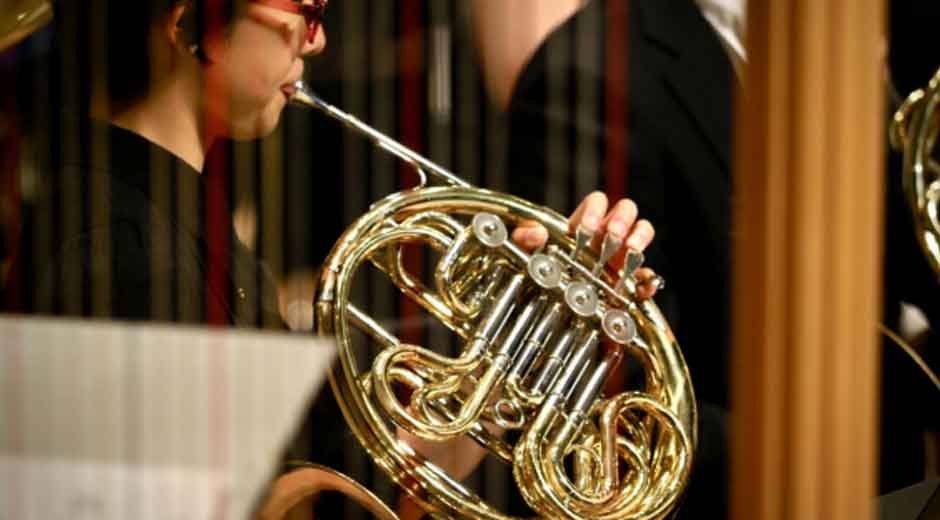The French horn, with its warm, rich tone and elegant design, is one of the most expressive instruments in the brass family. From majestic symphonic passages to intimate solos, it demands precision, artistry, and-most importantly right instrument in the hands of the right player. Choosing the perfect French horn is both a science and an art, influenced by a musician’s skill level, musical style, physical attributes, and personal preference.
Whether you’re a beginner selecting your first horn or a professional looking to upgrade, this guide will walk you through the nuances of selecting a French horn that fits your unique musical voice. Read on.
Understanding the Basics
Before diving into the different types of horns, it’s essential to understand the core components and terminologies. Here are some of them:
Single Horns
These are typically pitched in F or B♭ and are often recommended for beginners. This is due to their lighter weight and simpler mechanics.
Double Horns
These combine both F and B♭ horns, allowing players to switch between them for greater range and flexibility. They are standard for intermediate to professional players.
Triple Horns
These include an additional high F side. They are used primarily by advanced players who require extreme versatility.
Compensating Horns
A compromise between single and double horns, compensating horns offer a more compact design. This is while retaining some of the double horn’s range and flexibility.
Other important aspects include the horn’s bore size, bell shape, and material, and wrap design (typically Geyer or Kruspe). Make sure to visit a French Horn instrument shop to learn more about this instrument. This can help you choose the right musical instrument.
Matching the Horn to the Player
Choosing the right French horn for a musician can make all the difference in their playing experience. Each horn has its unique sound and characteristics, making it essential to match the horn to the player. Here’s a deeper dive:
Beginners and Students
For younger players or those just starting, a single horn in F is often ideal. These horns are lighter, easier to handle, and more affordable. They help students build foundational skills without being overwhelmed by the complexities of a double horn.
When selecting a beginner horn, consider:
Weight and Balance
Younger players often struggle with heavy instruments. A well-balanced horn will help prevent strain and improve posture.
Ease of Play
Look for horns with a smooth valve action and good intonation. Consistency in tone across registers helps build confidence.
Durability
Student models should be able to withstand occasional drops or dings. Nickel-silver horns are generally more durable than those made of yellow brass.
Intermediate Players
As students progress, transitioning to a double horn in F/B♭ becomes a logical next step. This change unlocks more tonal flexibility and range, making it easier to navigate challenging music.
Intermediate players should explore:
- Bell Detachability
- Wrap Style
- Material
Trying out several models and working with a teacher or horn technician is essential at this stage. It’s about finding an instrument that complements your growing technique and musical expression.
Advanced and Professional Musicians
For professionals, the French horn is an extension of their musical identity. Every nuance-from timbre to valve response-matters. Advanced players may explore custom-built horns, triple horns, or even vintage models with unique character.
Key considerations include:
Sound Projection
In large concert halls or ensemble settings, projection is crucial. Larger bell flares and nickel silver materials can help achieve a broader sound.
Valve Quality
Precision rotary valves reduce resistance and improve agility. Maintenance and alignment should be flawless.
Tonal Versatility
Professional hornists may require instruments that suit multiple settings-from solo recitals to full orchestra performances. A triple horn or a high-quality double horn with interchangeable leadpipes can provide this flexibility.
Additionally, top players often work closely with luthiers to modify their horns-adjusting trigger positions, valve springs, or custom leadpipes-to fit their playing style perfectly.
Considerations Beyond the Instrument
When it comes to mastering the art of playing the French horn, choosing the right instrument is crucial. But other considerations beyond the instrument itself are equally important. Here are some of those considerations:
Mouthpiece Matching
Even the best horn will underperform with the wrong mouthpiece. The mouthpiece affects tone, range, and comfort. Beginners typically start with medium-depth cups, while professionals may choose highly specialized designs to match their technique.
Personal Comfort and Ergonomics
Hand size, arm length, and lung capacity all influence which horn will feel best to a player. Some manufacturers offer adjustable finger hooks, hand rests, or even left-handed configurations.
Budget
French horns range in price from a few hundred dollars for a student model to over $10,000 for a custom-built professional horn. While quality often correlates with price, a well-maintained used horn can be a great investment.
Testing and Playability
Whenever possible, test several horns in real-world conditions- rehearsals, lessons, or performances. What feels great in a showroom might behave differently in an acoustic setting. Bring a trusted teacher, colleague, or even a tuner to help assess intonation, tone quality, and responsiveness.
Popular Brands and Models
Choosing the right French Horn can be a daunting task with the wide range of popular brands and models available. Each musician has their own unique needs and preferences, making it important to carefully consider before making a purchase. Some well-respected French horn brands include:
- Yamaha
- Conn
- Alexander
- Holton
- Paxman
Each brand has its design philosophy, so exploring different makes is worthwhile even at the same price point.
Buy the Best French Horn for Your Musical Journey
Choosing the right French horn is a deeply personal and artistic journey. It’s not just about specs- it’s about finding a sound partner, one that resonates with your musical voice and supports your growth. Whether you’re just beginning or have played for decades, take the time to explore, listen, and feel the difference.
The right horn doesn’t just play better- it inspires better playing. Invest wisely, play passionately, and let your horn be an extension of your soul.
If you want to read more articles, visit our blog.










